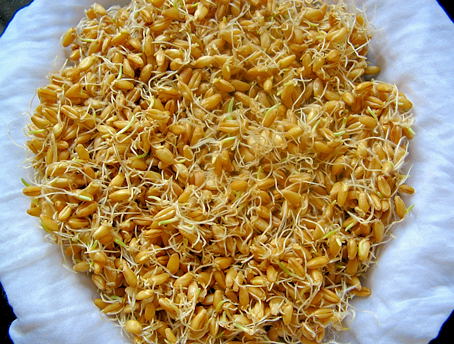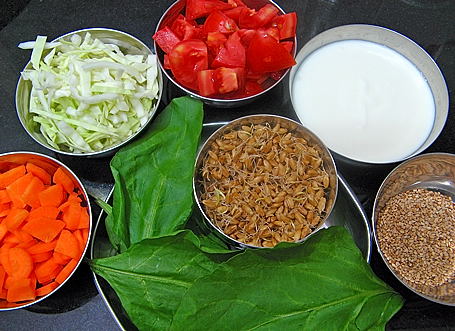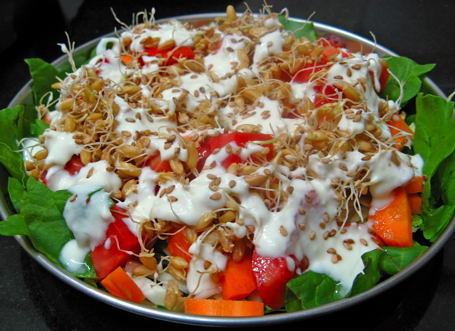Recipe: Sprouted Wheat and Spinach Salad

Published in December 2005 by Jaico Publishing House
Traditionally, salad or koshimbir has formed a small part of main meals in India, taking its place alongside pickles and chutneys. This probably explains why preparing salads has always flummoxed me. Grains, vegetables, and lentils formed a complete meal, and salads were the step-children on my thali. I managed with the usual suspects – chopped tomatoes and onions with a splash of lemon juice and salt; grated cabbage and crushed peanuts with a splash of lemon juice and salt; steamed beetroot and grated carrot with a splash of lemon juice and salt; *yawn* and so on. I did not fare any better at the elaborate salad bars in U.S. restaurants and cafetarias. With the seemingly endless choices, one never quite knows when and where to stop piling one’s bowl. The end result was always a mishmash of ingredients, all of which I savour individually, but were disastrous together. I also have a distaste for the usual dressings, based as they are in oil and vinegar.
I was not interested in the plethora of salad books found in the American bookstores. Since our main meals at home are always Indian, I needed a book that used Indian ingredients, and produced flavours that would not clash with the other parts of our meal. I had purchased Varsha Dandekar’s Salads of India many years ago, and while it is an excellent cookbook in other respects, it is not about salads. Most of the dishes were really sukhi bhaji (dry vegetable preparations without gravy). There are other books on salads published in India, but they usually just reproduced Western salads. Vijaya Hiremath’s book, which I almost ignored at the bookstore due to the rather bland title, has ended my days of salad ennui.
The book is completely vegetarian, with over 50 salad recipes using a wide variety of easily-available ingredients. Sprouts prepared from whole grains and beans play a prominent role in many recipes, a feature which raised the book several notches in my estimation. Hiremath presents several fresh and innovative combinations of vegetables, fruit, greens, nuts, and sprouts. For example, Country Garden Salad, a jaded menu item that evokes images of limp lettuce and cottony tomatoes, appears in an elegant and attractive avtaar in this book. It is made with tender fenugreek leaves, white radish, carrot, cucumber, tomato, onion, and roasted sesame seeds and dressed with lemon juice, minced garlic, fresh grated coconut, cumin powder, and salt. The dressings are sauces prepared from fruit, vegetables, or dahi; chutneys or dry masala powders. The layout of the book is user-friendly: one recipe per page with the nutritive value for each recipe provided at the bottom. There are plenty of photos, which are mercifully devoid of Indian artifacts and fabrics cluttered around the food.
The recipes use a combination of weight and volumetric measurements, which might pose a problem for those readers used to measuring in cups and do not own a kitchen scale. The instructions are terse and lacking in nuances. For example, greens and vegetables being used in salads must be properly rid of excess water after washing them; otherwise, it dilutes the dressing. Novice cooks might not realise this and the recipes do not include such instructions. The book also suffers another deficiency that is common to some cookbooks produced in India: absence of an index, which forces you to scan the entire table of contents if you are pondering over what to prepare with a particular ingredient. Each recipe, with calories ranging from 250 to 350, is supposed to provide one meal for a single person; but, small eaters might find the quantity too large to be consumed in one sitting. All these drawbacks, however, are minor irritations and easily overlooked once you taste the delicious and nutritious salads made from this book.
Veena Parrikar
Sprouted Wheat and Spinach Salad
Ingredients
100 gms wheat sprouts
100 gms carrot
100 gms tomato
100 gms cabbage
1 cup spinach leaves
Seasoning
2 flakes minced garlic
1 tsp roasted sesame seeds
150 gms thick curds (dahi)
Salt to taste

To prepare sprouted wheat, soak them overnight in plenty of water. Next morning, drain the wheat, and place the grains in a clean muslin cloth. Hang the muslin around your kitchen sink tap, and sprinkle the cloth with water. The wheat should sprout in two to three days in mild to warm weather. During this period, sprinkle water occasionaly if the muslin looks dry.
 Centre: Spinach and sprouted wheat. Clockwise from left: carrots, cabbage, tomatoes, dahi with minced garlic and salt, roasted sesame seeds.
Centre: Spinach and sprouted wheat. Clockwise from left: carrots, cabbage, tomatoes, dahi with minced garlic and salt, roasted sesame seeds. Method
1. Shred cabbage finely. If spinach is tender, use whole leaves; otherwise chop roughly or break into pieces with your hands.
2. Cut carrot into small pieces.
3. Quarter tomato.
4. Beat curds. Add garlic and salt and mix well.
5. Combine vegetables with sprouts.
6. Arrange spinach leaves on a flat dish.
7. Spread vegetable mixture over the spinach.
8. Pour curd mixture over the vegetables.
9. Sprinke sesame seeds before serving.

Sprouted Wheat and Spinach Salad
